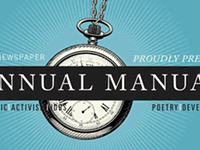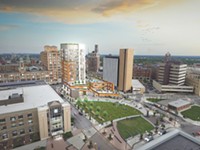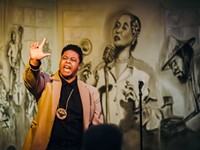The first months of 2017 have been chaotic.
President Donald Trump cleared the way for two controversial oil pipelines; he signed an order that upended the lives of immigrants and refugees — placing some of them in danger; and he stripped federal protections from transgender students.
For activists, 2017 will be unrelenting. They'll continue with existing fights, but they'll also face an onslaught of troubling proposals and decisions from the federal government on down. On the plus side, there's renewed public interest in protest and advocacy thanks to Trump.
"There is a lot going on because I think people are awake right now," says Rosemary Rivera, an organizer for Citizen Action of New York and a longtime Rochester and New York State education activist.
Here are some select issues — and these are just the tip of the iceberg — that local activists are watching.
Health care
Progressives are packing into Republican representatives' town hall meetings to express concern about the future of the Affordable Care Act. Trump and Congressional GOP leaders have promised to repeal and replace Obamacare, but Trump hasn't offered a blueprint. GOP leaders are hashing out proposals that could roll back Obamacare coverage requirements and state Medicaid expansions, among other things.
Reproductive rights groups are worried that the Supreme Court could overturn Roe v. Wade. Planned Parenthood faces a loss of potential federal Medicaid funding, which would hurt its many low-income patients. For a large chunk of those patients, their annual exam at Planned Parenthood is their only medical visit of the year, and they receive a range of health services, says Kate Farrington, a spokesperson for Planned Parenthood of Central and Western New York.
Advocates are also trying to build support for a couple of pieces of state legislation. One is the Comprehensive Contraceptive Coverage Act, which would require New York insurers to cover FDA-approved forms of birth control. The other would modernize the state's abortion laws.
[image-2School choice and education funding
Local public education activists are very worried about Trump and Betsy DeVos, his new education secretary. DeVos is a leading advocate for charter schools and vouchers, which provide public school funds for students to attend private schools.
This year, activists will continue pushing the state to increase its funding for public schools, especially for high-need urban districts. Boosting education funding to those districts is a way for the state government to invest in low-income communities, Rivera says.
Constitutional convention
This is something of a sleeper issue. Every 20 years, state voters have a chance to approve a Constitutional convention — "con con" in Albany speak — which would open the entire state Constitution to revision. The ordeal would be complicated and costly, and it comes with high stakes.
The convention provides an opportunity for meaningful elections and legislative ethics reforms, but it also makes vulnerable protections for workers, the Adirondacks parklands, and local governments. Public employees unions oppose the convention; politically, there are liberals and conservatives supporting and opposing it.
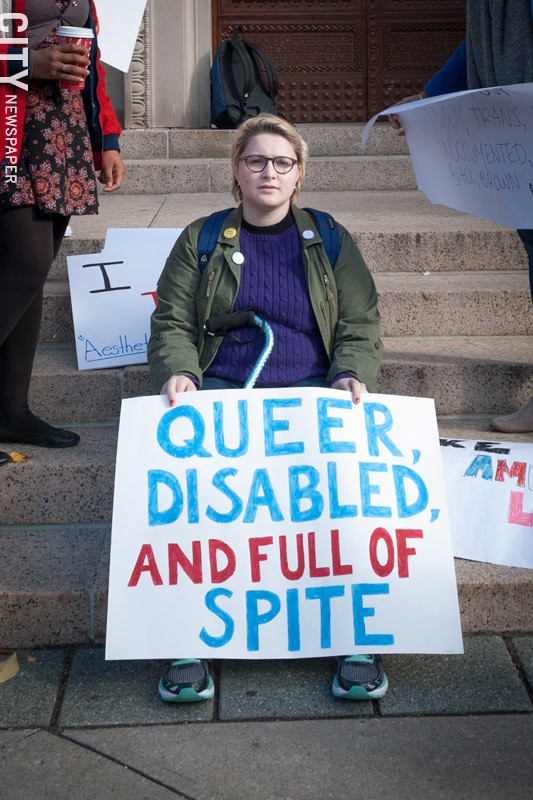
- PHOTO BY RYAN WILLIAMSON
- There will be no shortage of issues to unite activists during the Trump presidency.
Voting rights
ROCitizen, an activist group that formed out of Monroe County for Bernie Sanders, has lined up in support of the New York Votes Act, a legislative proposal advanced by Attorney General Eric Schneiderman. The proposal, which has been introduced in the Assembly, would provide for automatic registration of eligible voters, same-day registration for new voters, early voting, broader absentee ballot access, and voting rights for parolees.
Immigration
Trump's first executive order on immigration and refugees caused all hell to break loose. Green card holders were detained or denied access to the country. Refugee families were separated or kept from entering, and the whole US refugee system was sent into a tailspin. And though Trump says the order wasn't meant to target Muslims, they were hit the hardest.
A federal judge blocked the order, but Trump plans to issue a new one, which could actually be worse.
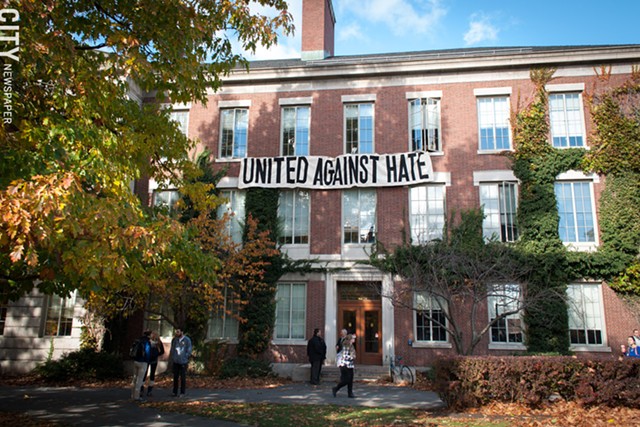
- PHOTO BY RYAN WILLIAMSON
- There will be no shortage of issues to unite activists during the Trump presidency.
Climate change
Local climate groups don't have much hope that the Trump administration will act on climate. The president has vowed to boost domestic fossil fuels production, gut federal climate programs, and take the US out of the Paris climate agreement.
Local activists say that they will focus their energy on state and local issues, as well as outreach to the region's Congressional representatives. For example, they'll push for state lawmakers to approve a bill that'll impose tighter limits on greenhouse gas emissions and continue fighting new fossil fuels infrastructure. Citizens' Climate Lobby will continue its efforts to get the region's Congress members to back a carbon fee and dividend plan: an emissions reduction approach that has bipartisan support.
If you want to get involved, you need to show up, say local activists. Go to rallies, forums, and meetings; and attend rallies and actions for groups that have supported your cause.
Visibility is important; rally organizers need large, loud crowds to sway decision-makers. Planned Parenthood asks its supporters to consider wearing shirts or putting bumper stickers on their cars as a show of support, but only if they're comfortable doing so, Farrington says.
But those are first steps. Rivera suggests that people interested in specific issues should find groups that are working on them, join up, and pitch in with organizing. She also says it's important for people to talk to neighbors and friends and to recruit them to go to rallies and talk to elected officials, for example.
"It's not all about Facebook and Twitter," says Bess Watts, a local union leader and president of Pride at Work's Finger Lakes chapter. "You really have to go out into the community and get to know organizations, whether it's environment, whether it's racial justice, economic justice, LGBT rights. There are organizations out there that can use your help and your funds."
Ravi Mangla, ROCitizen's organizing co-director, urges people to get involved in politics and attend their local committee meetings. His organization wants to get more progressives elected to office.
"I think so much of what happens is because we've been watching politics and not getting involved in it the way we should be," Mangla says.
